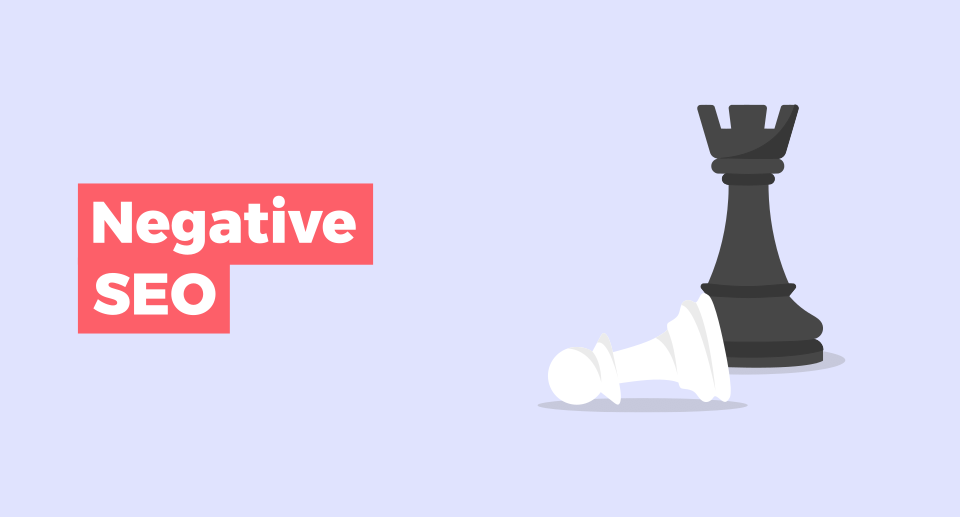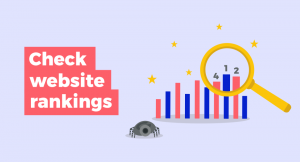Welcome to the wild, wild web, where the fastest click wins and everyone’s chasing that magical SEO boost — and where competitors might be lurking in the shadows trying to bring you down using negative SEO.
Consider this simple example: You own an e-shop that sells top-quality, competitively-priced electronics, but then a new company opens a similar one and hopes to “steal” some of your traffic.
Instead of doing this by offering better products, prices, or customer service, they decide it’s easier to “attack” you by spreading false information online.
For example, they might leave false negative reviews saying you don’t honor warranties or your products are often damaged or appear second-hand.
As a result, shoppers are scared of buying from your shop and move on to the competition instead.
What is negative SEO?
Negative SEO (or black hat SEO) is a set of malicious techniques that can harm the visibility of your website in Google Search. It is mostly used by competitors who are trying to achieve high positions for the same keywords.
Motivations behind negative SEO
Unfortunately, the motivations behind negative SEO are rather straightforward: competitors want to gain an advantage and are willing to play dirty to get it.
By negatively impacting your site’s SEO, they believe they can harm your business’ reputation and improve their own position in search engine results pages (SERPs).
In a world where a robust SEO standing is crucial for companies, the damage done by a successful negative SEO attack can be extensive.
Types of negative SEO
a) Spammy link building
Spammy link building is a common form of negative SEO.
According to a study by GoDaddy, over 73% of hacked sites were attacked strictly for SEO spam purposes.
This involves creating a large number of low-quality, irrelevant backlinks to a competitor’s website.
The aim is to trick search engine algorithms into thinking the targeted site is associated with shady or spam-filled web properties, which can result in penalization and a drop in rankings.
For example, your e-shop competitor can create backlinks to your website from adult content sites, gambling sites, or known link farms. These are all seen as spammy and “toxic” links by Google, and your site might suffer as a result.
Using spammy or inappropriate anchor text is another common technique.
It usually involves creating backlinks with anchor text that is not only unrelated to your site’s content but also offensive or spammy.
Attackers might even go as far as contacting websites that legitimately link to your site and request that the link be removed, affecting your rank.
b) Content scraping and duplication
Content scraping and duplication are other common forms of negative SEO.
Just as it sounds, it involves copying large sections of content from your site and reposting it on other websites, blogs, or even forums.
Because Google rewards unique content, having your content repeated all over the internet can affect your SEO — even if you’re the one republishing the content.
According to Google, “There are some penalties that are related to the idea of having the same content as another site—for example, if you’re scraping content from other sites and republishing it, or if you republish content without adding any additional value.”
Their key recommendation?
“Don’t create multiple pages, subdomains, or domains with substantially duplicate content.”
It’s important to note that Google has an active system in place to filter out duplicate content and identify the original source.
According to Google itself, “Having duplicate content does not have negative effects on your site’s presence in the Google index. It simply gets filtered out. Only when there are signals pointing to deliberate and malicious intent, occurrences of duplicate content might be considered a violation of the webmaster guidelines.”
c) Fake reviews and ratings
Fake reviews and ratings are perhaps one of the easiest tools for unethical competitors trying to hurt your online reputation.
All somebody has to do is stop by your e-shop’s Google Business Profile page and leave a number of fake negative reviews accusing you of selling faulty products or claiming your customer service is terrible.
This can not only affect your good standing as a business but can also impact sales.
d) Hacking & website manipulation
One of the most damaging forms of negative SEO is hacking and website manipulation.
This is a direct, targeted attack meant to make changes that directly affect the performance of your site and user experience.
If an attacker is able to hack into your website, they might choose to change your website’s content, adding spammy or inappropriate keywords that might confuse search engines.
Or they might manipulate meta tags, causing your pages to show up for irrelevant or inappropriate search queries.
More serious attacks might include adding malicious code to your site, such as using JavaScript injected directly into the site or into iframes, adding hidden links or hidden text to a page by using CSS or HTML, or redirecting your website traffic to other sites.
Because Google points out that “hacked content gives poor search results to our users and can potentially install malicious content on their machines,” this is the type of negative SEO that can really hurt you.
e) Distributed-Denial-of-Service (DDoS) attacks
A Distributed Denial of Service (DDoS) attack is meant to overload your server with so much traffic, it will eventually crash.
If somebody embarks on a DDoS attack, their goal is to keep your customers from accessing your site. Done on a special holiday like Black Friday, it could potentially cost you a lot of sales and damage your reputation.
Does negative SEO really work?
As unsettling as the concept of negative SEO is, you may be wondering: does it really work?
The answer is usually no, but in certain cases, yes.
This is in part thanks to Google becoming better and better at identifying and dealing with negative SEO tactics.
While back in the day Google’s algorithm would “reward” websites with a high volume of backlinks (even spammy ones) with a better ranking, things changed with the release of Google’s Penguin 4.0 update in September 2016.
Since then, Google looks at the quality of the links, essentially ignoring spammy backlinks when determining a site’s ranking.
Sometimes, however, even the mighty Google can’t stop negative SEO from damaging a site — especially when it involves hacking or DDoS attacks.
How to detect (& avoid) negative SEO
With so many negative SEO tactics out there, having a strong defense plan in place is essential to protect your online presence from attacks.
1. Watch out for a sudden drop in search engine rankings
The first sign that you might be the victim of a negative SEO attack is a sudden and unexplained drop in your search engine rankings.
You can use Google Search Console (GSC) to monitor any unexpected changes in your site’s performance — if you see a significant dip, it’s time to start digging deeper for a cause:
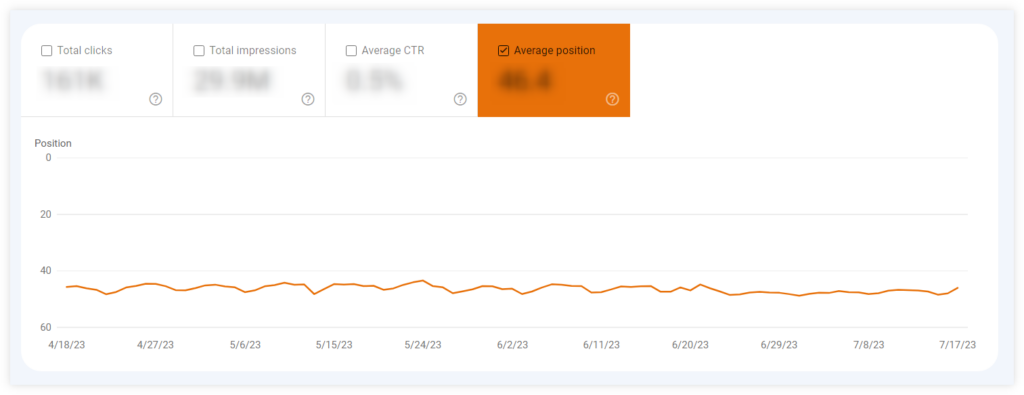
SERPWatcher is another great tool for tracking your keyword positions in different locations and devices.
It gives you a clear picture of your website’s visibility in real time, so any drastic changes will be obvious right away.
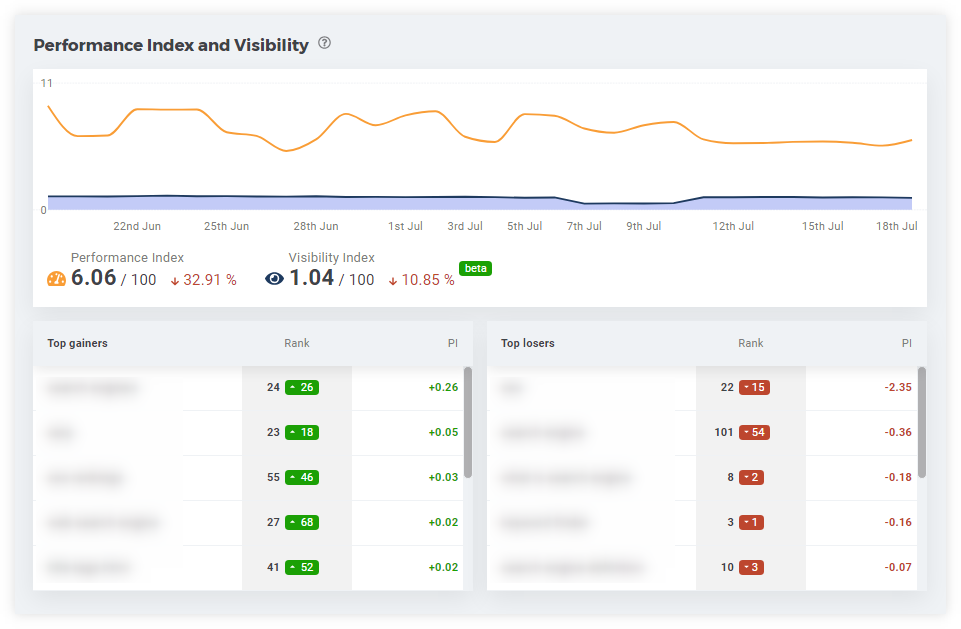
2. Perform a backlink audit
The next step is to conduct a backlink audit to check for shady backlinks pointing to your site.
GSC comes in handy for this task too, as it can show you who is linking to your site, making it easy to identify links from spammy sites:
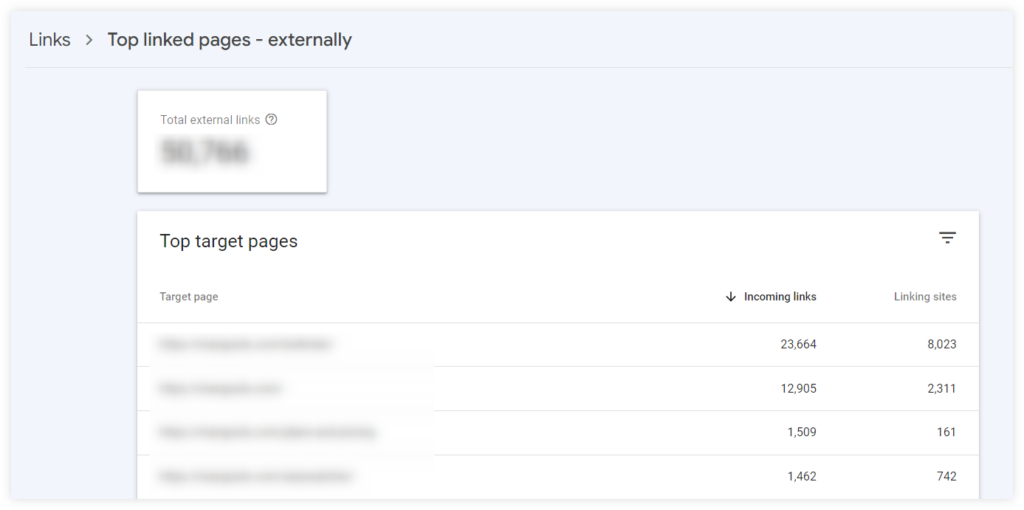
For a more detailed analysis, you can try LinkMiner, which analyzes not only the backlinks themselves but also their anchor texts and referring domains.
You can also use it to track important backlinks so you can see if a fake removal request has been made and act immediately:
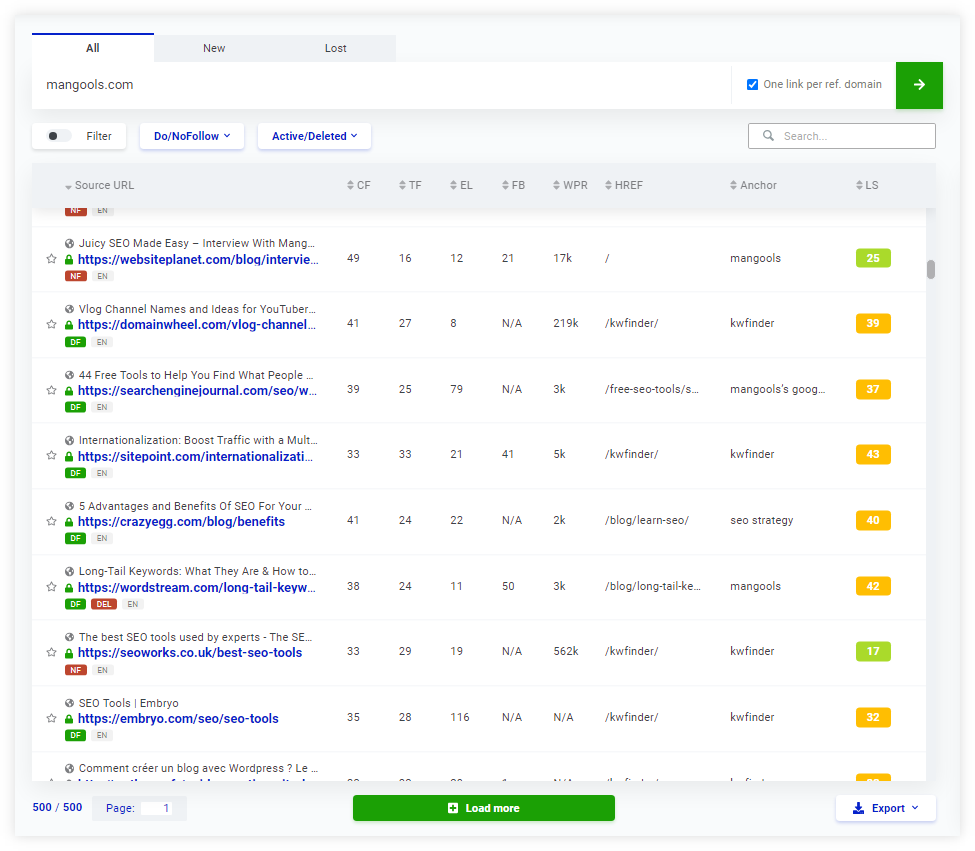
If you find that your site is tangled in a web of toxic backlinks, you can turn to the Google Disavow Tool for rescue — but use it with caution.
While great to communicate directly with Google and report spammy backlinks, it could potentially lead to you losing beneficial backlinks in the process too.
In fact, Google warns that “this is an advanced feature and should only be used with caution.
If used incorrectly, this feature can potentially harm your site’s performance in Google Search results.”
Instead, Google recommends trying to contact the webmasters of the sites linking to your site directly and only using the Google Disavow Tool as a last resort.
3. Address duplicate content issues
Think somebody has stolen your content?
Your first line of defense should be Google Search. It might sound primitive, but you can literally copy and paste chunks of your content into Google Search to check for duplicates.
For a more technologically sophisticated approach, try Google Search Console. After selecting your URL, check out the “Google-selected canonical.” If it’s different from your own URL, there’s likely a potential duplicate content issue.
You can also use paid tools like Copyscape and Siteliner to comb the internet to check if anyone has duplicated your content.
And if you find someone has copied your content? You can report it to Google or file a Digital Millennium Copyright Act (DMCA) report.
Tip: Websites that copy your content often leave your internal links there as well — which you can use to prove to Google that your version is the original one.
4. Be your own watchdog: Monitoring for fake reviews
Online reviews can significantly impact a business’s reputation. Positive reviews can help your business thrive, boosting trust, attracting more customers, and increasing conversions.
On the other hand, negative reviews can damage your image and deter potential customers.
And while it’s perfectly possible that the negative reviews you received are real, they can also be used by unscrupulous competitors to damage your reputation.
Here’s where vigilance is key. Regularly check review platforms like Google My Business, Yelp, and Trustpilot (and anywhere else your business might be listed).
If you notice strange reviews that don’t seem to match your business, it’s possible these are fake.
This could include threatening or violent reviews, vague reviews like “Worst customer service EVER!” without explaining what happened, or a sudden burst of negative reviews in a short timeframe.
You can then flag or report reviews that violate a platform’s guidelines.
5. Check and improve website security
Website security is vital for a variety of reasons, including protecting website integrity, preventing DDoS attacks, and maintaining user experience.
As a first line of defense, head to the Google Search Console and check the “Security issues” tab to ensure no breaches have occurred:
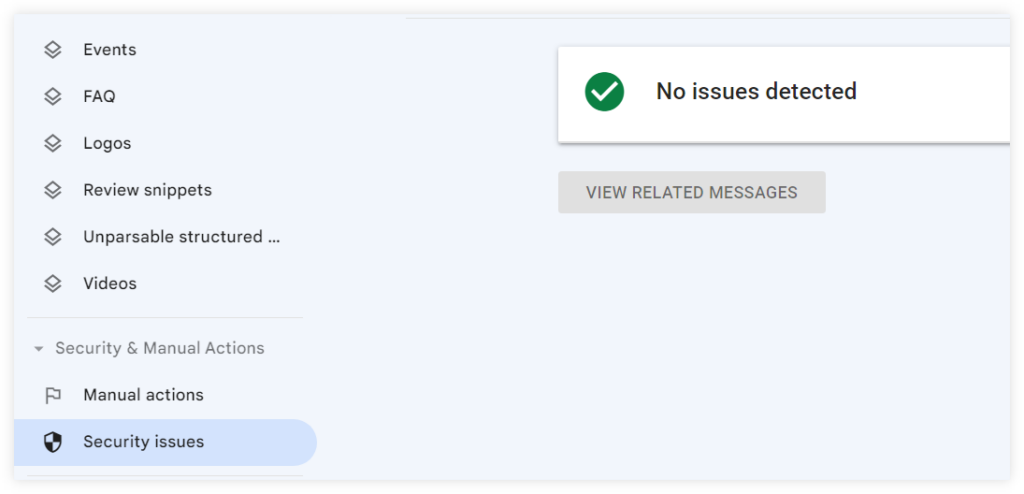
Here, you’ll find any possible security problems that Google’s systems may have detected, including malware threats, phishing attacks, hacked content, and server vulnerabilities.
Next, make sure you boost your defense by installing security plugins and implementing safety measures, like having strong passwords, enabling two-factor authentication, and using a Content Delivery Network (CDN) to increase your site’s security and performance.
6. Monitor website performance
The online world is a bustling marketplace, and your website is your store’s front window.
Things like slow-loading web pages, server errors, or downtime can frustrate customers and make them move on to somebody else.
A good place to start is with a monitoring tool like UptimeRobot:
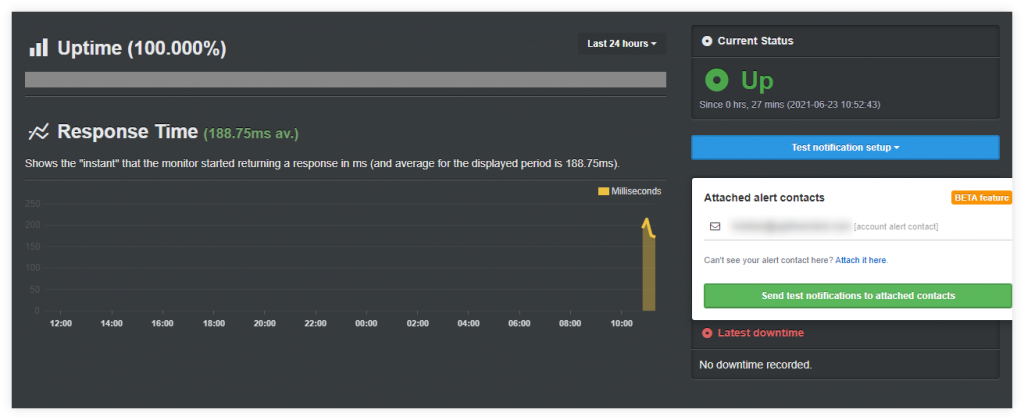
Whether it’s slow server response times, failed page loads, or complete server unavailability, UptimeRobot can send you alerts via email, SMS, push notifications, or third-party applications like Slack when it detects these issues.
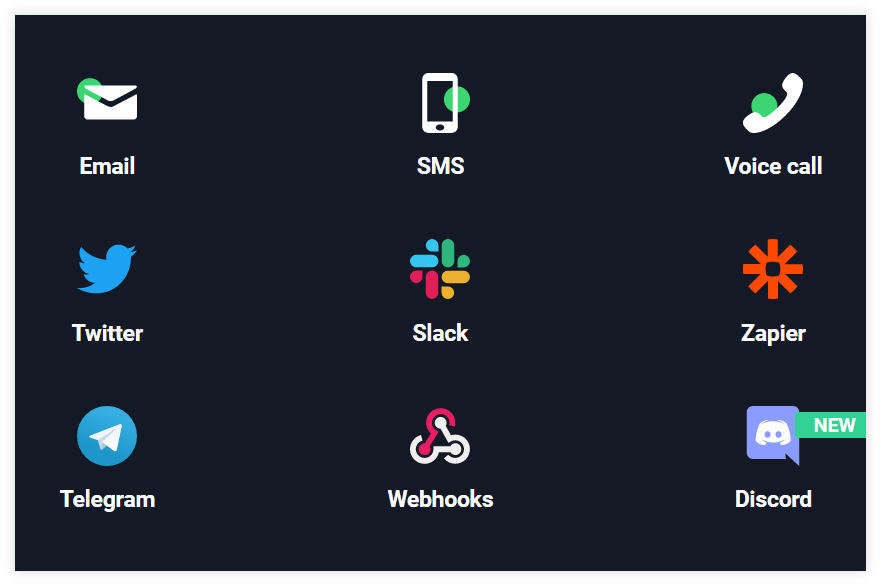
This will allow you to take action and start dealing with the problem immediately.
What about preventing a Distributed Denial of Service (DDoS) attack from taking your website offline?
A CDN can also help by distributing your website’s content across a network of servers around the globe.
This distribution not only helps speed up your website’s load times but also protects against DDoS attacks by diffusing the horde of fake traffic across its network.
Final thoughts
Despite its potential for causing a lot of harm, negative SEO isn’t invincible.
Armed with the right tools and a proactive defense plan, you can shield your website from tactics meant to damage your reputation and search rankings.
Using Google Search Console, security plugins, and website performance monitoring with tools like UptimeRobot, businesses can not only detect but also prevent negative SEO attacks.
The wild, wild web can be a scary place sometimes, but with the right plan in place, your website can still thrive against the competition.


